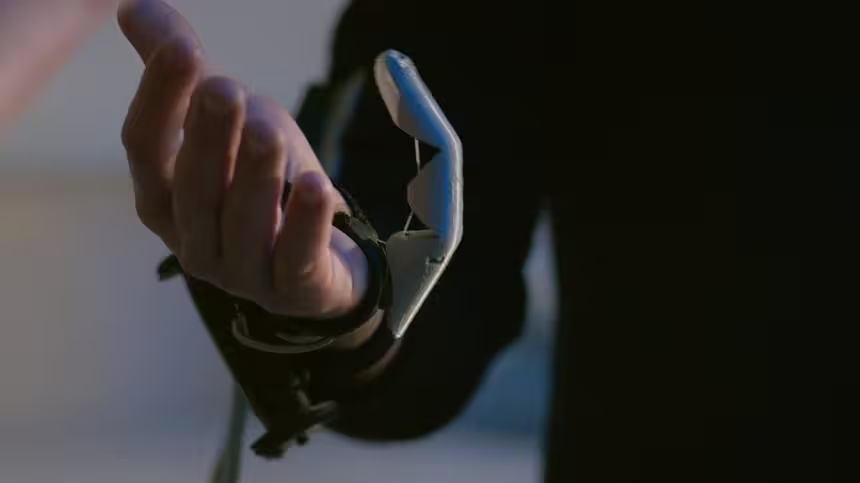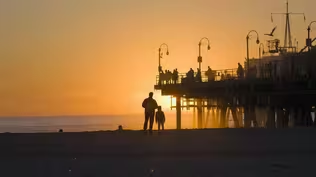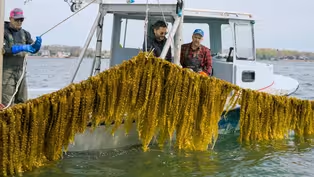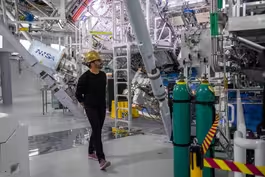
Employing Long-Term Thinking to Empower Better Solutions
Clip: Episode 1 | 10mVideo has Closed Captions
Bren Smith shares his journey to promote sustainable practices in the fishing community.
Exploring the vital importance of long-term thinking, Bren Smith shares his journey from a traditional fisherman to an ocean farmer who grows kelp and promotes sustainable practices. He discusses the versatility of kelp, its potential uses, and the need to bridge the gap between land and sea farming.
Problems playing video? | Closed Captioning Feedback
Problems playing video? | Closed Captioning Feedback
Supported by the Hoveida Family Foundation and The Rosalind P. Walter Foundation.

Employing Long-Term Thinking to Empower Better Solutions
Clip: Episode 1 | 10mVideo has Closed Captions
Exploring the vital importance of long-term thinking, Bren Smith shares his journey from a traditional fisherman to an ocean farmer who grows kelp and promotes sustainable practices. He discusses the versatility of kelp, its potential uses, and the need to bridge the gap between land and sea farming.
Problems playing video? | Closed Captioning Feedback
How to Watch A Brief History of the Future
A Brief History of the Future is available to stream on pbs.org and the free PBS App, available on iPhone, Apple TV, Android TV, Android smartphones, Amazon Fire TV, Amazon Fire Tablet, Roku, Samsung Smart TV, and Vizio.
Buy Now

What It Means to Be Human
A Brief History of the Future explores the human ability to increase empathy and compassion, what values we are instilling into artificial intelligence technologies, and the need to create both a better world and a better humanity for life to flourish on this planet.Providing Support for PBS.org
Learn Moreabout PBS online sponsorship- I'm Sophie Howe, and I was the first future generations commissioner for Wales and the first future generations commissioner in the world.
Back in 2015, our national parliament passed a law called the Well-Being of Future Generations Act.
- What we need to do is take a systems approach to thinking about the impact of all of our actions, what impact they have today, but crucially in the context of this bill, what impact they have in the future.
- They held a national conversation with the citizens of Wales where they posed the question, what's the Wales you want to leave behind to your children, your grandchildren, and future generations to come?
That dialogue led to the government identifying seven long-term well-being goals, and all of our public institutions must set objectives which maximize their contribution to all seven goals.
- Are you seeing sufficient scale and pace of progress?
- The guidance made no reference to the Future Generations Act at all.
And this is part of the challenge that we're seeing.
Built into our legislation, the government and our other public institutions have to take the advice of the commissioner or justify why not.
And they have to justify that publicly.
So in Wales, because we have this framework, we've completely transformed the way that we're thinking about transport planning, for example, building a new stretch of motorway to deal with the problem of congestion.
It's what we've always done.
But the commissioner's intervention really challenged the government, because you've never shifted your investment to actually giving people other means of transportation, more walking, cycling, safe routes to those areas and public transport investment to those areas.
We'll start to see air pollution reducing.
We'll start to see more people cycling, which is good for their health.
The long-term impact, of course, is that we want to see an increase in life expectancy.
So I think people are increasingly starting to see those connections.
If we can embrace models like we have in Wales, that has the potential to have a real trickle-down effect.
And imagine if we multiply that by every decision or every approach that a public institution or a government take to deciding how they're going to roll out policy and encourages them to-- well, not just encourages them, actually requires them to join the dots and think in a long-term way.
- We struggle a lot with long-term thinking, and we tend to default to short term-thinking quite often.
And so we've kind of set up multiple aspects of society to work in a short-term capacity.
One of the first questions I like to ask is, who's benefiting from the system being this way?
Our systems are not really broken.
That's a bit of a misconception to say that.
I think our systems are designed to work exactly the way they are.
They're just not necessarily designed to work for you and I.
- Pollution is contamination of the environment that interferes with the processes of life.
In seeking a better life on Earth, man in the 20th century has created a great technology at the expense of the environment essential to life.
- We like identifying ourselves as an intelligent species.
But who made that measurement?
We did.
We are polluting our environment.
We are altering the very ecosystem that we need to survive.
We're creating a next wave of extinction across the tree of life without knowing what the long-term consequences of that might be.
I could define intelligence in such a way so that there is no sign of it here on Earth.
My biggest fear is that, though we call ourselves intelligent, that we might not be wise enough to be the shepherds we need to be to assure the survival of generations yet to be born.
- Having anxiety about the future is not an unreasonable thing.
It's actually very logical in some ways when you look at the data around what we're seeing in the world.
But the important thing is that we have the opportunity to shape it.
And the hopeful part of that is that we actually have all the solutions we need to address the problems.
What we don't have is the context for those solutions to take hold.
- I'm interested in exploring more of these new solutions and meeting the people who are creating them.
That led me here to New Haven, where a former fisherman turned ocean farmer named Bren Smith has become a catalyst for change in this community.
So, Bren, I have no idea what a regenerative ocean farmer is.
So both, I want you to tell me what it is and how you got into it.
- Sure.
I was born and raised in Newfoundland, Canada, the edge of North America.
All I wanted to be was a fisherman.
That was my dream.
I didn't want to be a politician.
I didn't want to be an astronaut.
So I dropped out of high school when I was 14 and headed out to sea and fished the globe.
Cod, crab, tuna, you name it, I fished it.
As I moved through, the problem was, I was fishing at the height of the industrial fishery tearing up whole ecosystems, you know, the things that we know now.
But when I was in-- out in the Bering Sea, the cod stocks crashed in Newfoundland, Canada.
And that was such a wake-up call, because I thought environmentalism was about birds and bees and bears.
And to see 30,000 people thrown out of work, fishermen walking the streets like hungry ghosts, an economy built up and a culture built up over hundreds of years around a fishery, you realize like, oh, this isn't about the environment.
This is about the economies, the kitchen table issue.
This is that there will be no jobs on a dead ocean.
- Bren's path led him to ocean farming, where he now grows kelp and trains hundreds of other fishermen just like him to look at the ocean in a whole new way.
In a time of growing concern around land-based agriculture, he sees untapped potential here at sea.
- I might come in again here.
Let's see, Ron.
So I've been farming this patch of water for almost 20 years.
And what you're looking here at is 10 acres of kelp farm.
So we have anchors on the side of the farm and then just rows of crop.
And the kelp is sitting about, you know, 6, 7 feet below the surface.
And our job as farmers is just to get the right amount of sunlight and nutrients in order to grow.
So we care about the depth and what time of year we're planting, what temperature.
So it's just simple as can be.
You know, I wish it was more complicated.
I'd seem smarter.
But the idea is, when you're working with the ocean, you need to be a willow, not an oak.
And you need to be something that you can remove and rebuild really easily.
Ron, now-- hey, Ron, we got a lot of pressure right here.
Here we go.
Now, let me clean it.
All right.
There we go.
So what we're going to do is, you're just going to grab a clump with your hand here and cut along.
But try to-- don't cut the rope.
So I'd rather you go below.
And just lift it on high.
OK. OK. Do some more here.
I'm just going to cut.
The power of kelp is that it has so many uses.
Like, yes, we can eat it, and we should eat it, and it's going to be the center of the plate, because it's going to be affordable.
We can make it delicious.
There's so much creativity in the food sector.
You can use it for biostimulants and fertilizer and land-based ag for feed, cosmetics, pharmaceuticals.
Bioplastics is a huge industry now.
The idea is really to break down this sea wall between land and sea farming.
Nutrients are in the waters-- too much of it-- like phosphorus, nitrogen, carbon, all this sort of stuff.
It's collecting these plants to do it, bring it back, and use it for fertilizers, biostimulants, things like that, because there are all these micronutrients that apple orchards need, flower farms, all this sort of stuff, that it just is very accessible to the land-based plants.
- The old story, in terms of humans and the sea is, we go out there, we take what we want, ae take as much as we want as quickly as we want, and then you go back to land, and we consume it.
What's the new story?
- I think it's a great question.
We do need a story for the future, right?
The biggest thing-- and I think this gets missed in the climate discussion a lot-- is that there needs to be a cultural transition.
And you need to think about, like, what motivates people?
What fills their soul and gets them up in the morning?
This isn't necessarily about money.
And that moment, when I was a kid, and, like, wanted to be a fisherman because they had self-directed lives and the pride of feeding their communities, that's what we need to tap into.
That's what motivates folks.
And as a kelp farmer, yeah, I've had to say goodbye to rogue waves and chasing fish.
But what I can embrace-- I own my own boat.
I succeed and fail on my own terms.
I got to be, like, an engineer, a scientist, a farmer, all this sort of stuff at once.
And I get to feed the folks around me.
These are soul-filling jobs.
And that's the discussion we have with fishermen.
Like, yes, we all have to say goodbye to some things.
But do we get the core of what makes us wake up every morning?
And that's how you build an army of innovation at the end of the day, of blue-collar innovation.
And quite honestly, you get the politics right.
Like, if you can tap into that, where people see themselves as part of the solution, then the level of innovation and knowledge networks and sharing and stuff, I think that's where we transition to a better future.
Because you just want millions of minds trying to figure this out.
But you've got to tap into the soul to do that.
Video has Closed Captions
Preview: Ep1 | 30s | What do we imagine when we think about the future? (30s)
Groundbreaking Clean Energy Technologies
Video has Closed Captions
Clip: Ep1 | 8m 29s | Ari visits exciting, large-scale solar and nuclear energy solutions operating today. (8m 29s)
Providing Support for PBS.org
Learn Moreabout PBS online sponsorshipSupport for PBS provided by:
Supported by the Hoveida Family Foundation and The Rosalind P. Walter Foundation.

















